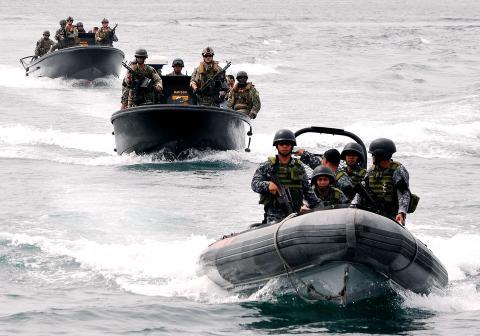Philippine President Benigno Aquino III yesterday denied reports he had asked the US for spy planes to monitor a territorial dispute with China in the South China Sea.
Aquino told reporters that his country had its own ships and aircraft to keep an eye on the disputed Scarborough Shoal (Huangyan Island, 黃岩島) and that he had merely mentioned in an interview that US aircraft could be called upon for help if needed.
“If you will go through the transcript of the interview, I said: ‘We might’ [ask for US help],” he said.

Photo: EPA
“That is where [the interviewers] suddenly introduced the supposed request for overflights, which wasn’t what I stated,” he said.
Aides said Aquino had made the remarks during an interview with a foreign news agency on Monday.
Subsequent reports of the president’s alleged requests for US spy planes raised concerns within China, with the country warning the Philippines against provocation over the three-month standoff between the two countries.
“Let us correct that. America is a treaty ally. Where we are lacking in capacity, I think we can go to them and ask that they increase [our] situational awareness,” Aquino said yesterday.
The shoal stand-off began in April when Chinese vessels prevented the Philippine navy from arresting Chinese fishermen encroaching on what the Filipinos claim is a part of their country’s territory.
China claims nearly all of the South China Sea, even waters close to the coasts of its neighbors.
In addition to the whole of the Scarborough Shoal, the Philippines also claims parts of the Spratly Islands (Nansha Islands, 南沙島). It says the shoal is well within its 200 nautical mile (370km) exclusive economic zone.
Taiwan also claims part of the Spratlys.
Aquino yesterday said that the Philippines had withdrawn its own ships from the shoal almost three weeks ago, but Chinese ships were still in the area.
“If their vessels had also gone home ... there would be no more issue. So who is prolonging the issue?” he said.
“There are a lot of things being said by the other side. Maybe they need to balance their statements with the truth,” he said.
Meanwhile, the Philippines announced yesterday that it had filed a diplomatic protest with China over Beijing’s establishment of a new prefecture called “Sansha” to administer disputed territories in the South China Sea.
Philippine Foreign Ministry spokesman Raul Hernandez said Sansha’s establishment violated Manila’s claim to the Scarborough Shoal and parts of the Spratlys, and the continental shelf and waters off the country’s western coast.
He told reporters the ministry was awaiting the Chinese government’s response to the protest.
Vietnam has also protested China’s action because of its claims to several islands and islets..
China’s Cabinet approved the establishment of Sansha last month to administer three major island groups in the South China Sea and the surrounding waters, with the government seat to be based in the Paracel Islands (Xisha Islands, 西沙群島), which Taiwan also lays claim to.
Hernandez said Beijing’s decision contradicted a non-aggression accord signed by China and ASEAN in 2002 to prevent the territorial disputes from turning violent.
Additional reporting by AP

ENDEAVOR MANTA: The ship is programmed to automatically return to its designated home port and would self-destruct if seized by another party The Endeavor Manta, Taiwan’s first military-specification uncrewed surface vehicle (USV) tailor-made to operate in the Taiwan Strait in a bid to bolster the nation’s asymmetric combat capabilities made its first appearance at Kaohsiung’s Singda Harbor yesterday. Taking inspiration from Ukraine’s navy, which is using USVs to force Russia’s Black Sea fleet to take shelter within its own ports, CSBC Taiwan (台灣國際造船) established a research and development unit on USVs last year, CSBC chairman Huang Cheng-hung (黃正弘) said. With the exception of the satellite guidance system and the outboard motors — which were purchased from foreign companies that were not affiliated with Chinese-funded

PERMIT REVOKED: The influencer at a news conference said the National Immigration Agency was infringing on human rights and persecuting Chinese spouses Chinese influencer “Yaya in Taiwan” (亞亞在台灣) yesterday evening voluntarily left Taiwan, despite saying yesterday morning that she had “no intention” of leaving after her residence permit was revoked over her comments on Taiwan being “unified” with China by military force. The Ministry of the Interior yesterday had said that it could forcibly deport the influencer at midnight, but was considering taking a more flexible approach and beginning procedures this morning. The influencer, whose given name is Liu Zhenya (劉振亞), departed on a 8:45pm flight from Taipei International Airport (Songshan airport) to Fuzhou, China. Liu held a news conference at the airport at 7pm,

Taiwan was ranked the fourth-safest country in the world with a score of 82.9, trailing only Andorra, the United Arab Emirates and Qatar in Numbeo’s Safety Index by Country report. Taiwan’s score improved by 0.1 points compared with last year’s mid-year report, which had Taiwan fourth with a score of 82.8. However, both scores were lower than in last year’s first review, when Taiwan scored 83.3, and are a long way from when Taiwan was named the second-safest country in the world in 2021, scoring 84.8. Taiwan ranked higher than Singapore in ninth with a score of 77.4 and Japan in 10th with

GRIDLOCK: The National Fire Agency’s Special Search and Rescue team is on standby to travel to the countries to help out with the rescue effort A powerful earthquake rocked Myanmar and neighboring Thailand yesterday, killing at least three people in Bangkok and burying dozens when a high-rise building under construction collapsed. Footage shared on social media from Myanmar’s second-largest city showed widespread destruction, raising fears that many were trapped under the rubble or killed. The magnitude 7.7 earthquake, with an epicenter near Mandalay in Myanmar, struck at midday and was followed by a strong magnitude 6.4 aftershock. The extent of death, injury and destruction — especially in Myanmar, which is embroiled in a civil war and where information is tightly controlled at the best of times —